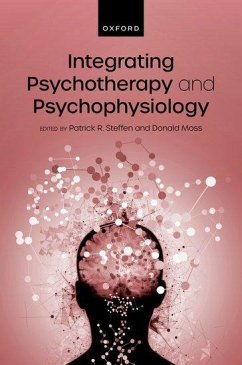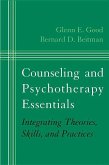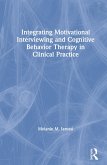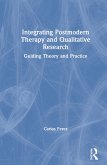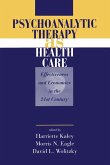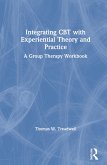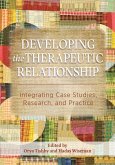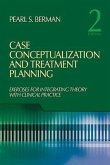Integrating Psychotherapy and Psychophysiology
Theory, Assessment, and Practice
Herausgeber: Steffen, Patrick; Moss, Donald
Integrating Psychotherapy and Psychophysiology
Theory, Assessment, and Practice
Herausgeber: Steffen, Patrick; Moss, Donald
- Gebundenes Buch
- Merkliste
- Auf die Merkliste
- Bewerten Bewerten
- Teilen
- Produkt teilen
- Produkterinnerung
- Produkterinnerung
In recent years it has become common for psychotherapists to use psychophysiological approaches such as biofeedback as a part of their therapy. This book provide a guide to professionals in the field on how to effectively integrate psychotherapy and psychophysiology.
Andere Kunden interessierten sich auch für
![Counseling and Psychotherapy Essentials: Integrating Theories, Skills, and Practices Counseling and Psychotherapy Essentials: Integrating Theories, Skills, and Practices]() Bernard D. BeitmanCounseling and Psychotherapy Essentials: Integrating Theories, Skills, and Practices55,99 €
Bernard D. BeitmanCounseling and Psychotherapy Essentials: Integrating Theories, Skills, and Practices55,99 €![Integrating Motivational Interviewing and Cognitive Behavior Therapy in Clinical Practice Integrating Motivational Interviewing and Cognitive Behavior Therapy in Clinical Practice]() Melanie M IarussiIntegrating Motivational Interviewing and Cognitive Behavior Therapy in Clinical Practice183,99 €
Melanie M IarussiIntegrating Motivational Interviewing and Cognitive Behavior Therapy in Clinical Practice183,99 €![Integrating Postmodern Therapy and Qualitative Research Integrating Postmodern Therapy and Qualitative Research]() Carlos PerezIntegrating Postmodern Therapy and Qualitative Research194,99 €
Carlos PerezIntegrating Postmodern Therapy and Qualitative Research194,99 €![Psychoanalytic Therapy as Health Care Psychoanalytic Therapy as Health Care]() Psychoanalytic Therapy as Health Care90,99 €
Psychoanalytic Therapy as Health Care90,99 €![Integrating CBT with Experiential Theory and Practice Integrating CBT with Experiential Theory and Practice]() Thomas W TreadwellIntegrating CBT with Experiential Theory and Practice191,99 €
Thomas W TreadwellIntegrating CBT with Experiential Theory and Practice191,99 €![Developing the Therapeutic Relationship: Integrating Case Studies, Research, and Practice Developing the Therapeutic Relationship: Integrating Case Studies, Research, and Practice]() Developing the Therapeutic Relationship: Integrating Case Studies, Research, and Practice99,99 €
Developing the Therapeutic Relationship: Integrating Case Studies, Research, and Practice99,99 €![Case Conceptualization and Treatment Planning: Integrating Theory with Clinical Practice Case Conceptualization and Treatment Planning: Integrating Theory with Clinical Practice]() Pearl S. BermanCase Conceptualization and Treatment Planning: Integrating Theory with Clinical Practice131,99 €
Pearl S. BermanCase Conceptualization and Treatment Planning: Integrating Theory with Clinical Practice131,99 €-
-
-
In recent years it has become common for psychotherapists to use psychophysiological approaches such as biofeedback as a part of their therapy. This book provide a guide to professionals in the field on how to effectively integrate psychotherapy and psychophysiology.
Hinweis: Dieser Artikel kann nur an eine deutsche Lieferadresse ausgeliefert werden.
Hinweis: Dieser Artikel kann nur an eine deutsche Lieferadresse ausgeliefert werden.
Produktdetails
- Produktdetails
- Verlag: Oxford University Press
- Seitenzahl: 448
- Erscheinungstermin: 24. September 2024
- Englisch
- Abmessung: 239mm x 170mm x 33mm
- Gewicht: 975g
- ISBN-13: 9780198888727
- ISBN-10: 0198888724
- Artikelnr.: 69904858
- Herstellerkennzeichnung
- Produktsicherheitsverantwortliche/r
- Europaallee 1
- 36244 Bad Hersfeld
- gpsr@libri.de
- Verlag: Oxford University Press
- Seitenzahl: 448
- Erscheinungstermin: 24. September 2024
- Englisch
- Abmessung: 239mm x 170mm x 33mm
- Gewicht: 975g
- ISBN-13: 9780198888727
- ISBN-10: 0198888724
- Artikelnr.: 69904858
- Herstellerkennzeichnung
- Produktsicherheitsverantwortliche/r
- Europaallee 1
- 36244 Bad Hersfeld
- gpsr@libri.de
Patrick R. Steffen, PhD, is a Professor of Psychology at Brigham Young University where he has served as the Director of Clinical Training and as an Alcuin Fellow in the Honors Program. He received his PhD in Clinical Health Psychology from the University of Miami and was a post-doctoral fellow in cardiovascular behavioral medicine at Duke University Medical Center. He is a Fellow of the Association for Applied Psychophysiology and Biofeedback and is a past president of that organization and serves as Associate Editor for the journal Applied Psychophysiology and Biofeedback. His research interests are in behavioral medicine and integrating biofeedback approaches into psychotherapy. Dr. Donald Moss is Professor and Dean, College of Integrative Medicine and Health Sciences, at Saybrook University, Pasadena, CA. He is a clinical health psychologist, certified in biofeedback and hypnosis. Moss is the ethics chair for the Biofeedback Certification International Alliance. He is the education chair, publications chair, and president-elect for the Society for Clinical and Experimental Hypnosis (SCEH). He previously served as president of SCEH, president of Division 30 (hypnosis) of the American Psychological Association, and president of AAPB.
* Section One: Theory
* 1: Paul Gilbert: An Evolution and Compassion Informed Biopsychosocial
Approach to the Challenge of Building an Integrated Science for
Psychotherapy
* 2: Rebekkah Matheson: Neuroscientific Principles Underlying
Psychotherapy
* 3: Julia Wendt and Julian F. Thayer: 1. Heart Rate Variability in
Mental Health and Psychotherapy
* 4: Sadie J. Zacharek, John D. E. Gabrieli and Stefan G. Hofmann:
Brain Plasticity and Prediction of Response in Psychotherapy
* 5: Travis Anderson and Patrick Steffen: Affect as a Foundation for
How We Know and Understand the World: A Framework for Integrating
Psychotherapy and Psychophysiology
* Section Two: Assessment
* 7: Dawson Hedges and Patrick Steffen: Approaching Psychopathology
from a Psychophysiological Perspective: Using Dimensional Diagnostic
Approaches as Frameworks to Integrate Psychotherapy and
Psychophysiology
* 8: Brian M. Hughes, Siobhán Howard and Aisling M. Costello,: The
Biology of Personality and Stress: Cardiovascular Reactivity as
Central to Human Coping
* 9: Patrick Steffen and Joseph A. Olson: Using the RDoC Framework to
Conceptualize and Assess Personality: A Model of Personality for
Psychotherapy/Psychophysiology Integration
* Section Three: Intervention
* 10: Paul Lehrer: Therapist Flexibility: Why a Psychophysiological
Component in Psychotherapy is Important
* 11: Paul Gilbert: Compassion as an Integrative and Integrating
Therapeutic Process
* 12: Timothy W. Smith and Jenny M. Cundiff,: An Interpersonal
Perspective on the Physiological Stress Response: Implications for
Therapeutic Interventions in Coronary Heart Disease
* 13: Donald Moss: The Most Beautiful Man: The Integration of Hypnosis
and Biofeedback
* 14: Richard S. Gevirtz: Integrating Heart Rate Variability
Biofeedback into Acceptance and Commitment Therapy (ACT)
* 15: Inna Khazan: Breathing, Heart Rate Variability, and their
Application in Psychotherapy
* 16: Nicola Petrocchi and Cristina Ottaviani: Compassionate Bodies,
Compassionate Minds: Psychophysiological Concomitants of
Compassion-Focused Therapy
* 17: Chase S. Sherwell and James N. Kirby: Compassion Focused Therapy
and Heart Rate Variability
* 18: Donald Moss: Ethical Principles and Practice Standards in
Psychophysiological Psychotherapy
* 1: Paul Gilbert: An Evolution and Compassion Informed Biopsychosocial
Approach to the Challenge of Building an Integrated Science for
Psychotherapy
* 2: Rebekkah Matheson: Neuroscientific Principles Underlying
Psychotherapy
* 3: Julia Wendt and Julian F. Thayer: 1. Heart Rate Variability in
Mental Health and Psychotherapy
* 4: Sadie J. Zacharek, John D. E. Gabrieli and Stefan G. Hofmann:
Brain Plasticity and Prediction of Response in Psychotherapy
* 5: Travis Anderson and Patrick Steffen: Affect as a Foundation for
How We Know and Understand the World: A Framework for Integrating
Psychotherapy and Psychophysiology
* Section Two: Assessment
* 7: Dawson Hedges and Patrick Steffen: Approaching Psychopathology
from a Psychophysiological Perspective: Using Dimensional Diagnostic
Approaches as Frameworks to Integrate Psychotherapy and
Psychophysiology
* 8: Brian M. Hughes, Siobhán Howard and Aisling M. Costello,: The
Biology of Personality and Stress: Cardiovascular Reactivity as
Central to Human Coping
* 9: Patrick Steffen and Joseph A. Olson: Using the RDoC Framework to
Conceptualize and Assess Personality: A Model of Personality for
Psychotherapy/Psychophysiology Integration
* Section Three: Intervention
* 10: Paul Lehrer: Therapist Flexibility: Why a Psychophysiological
Component in Psychotherapy is Important
* 11: Paul Gilbert: Compassion as an Integrative and Integrating
Therapeutic Process
* 12: Timothy W. Smith and Jenny M. Cundiff,: An Interpersonal
Perspective on the Physiological Stress Response: Implications for
Therapeutic Interventions in Coronary Heart Disease
* 13: Donald Moss: The Most Beautiful Man: The Integration of Hypnosis
and Biofeedback
* 14: Richard S. Gevirtz: Integrating Heart Rate Variability
Biofeedback into Acceptance and Commitment Therapy (ACT)
* 15: Inna Khazan: Breathing, Heart Rate Variability, and their
Application in Psychotherapy
* 16: Nicola Petrocchi and Cristina Ottaviani: Compassionate Bodies,
Compassionate Minds: Psychophysiological Concomitants of
Compassion-Focused Therapy
* 17: Chase S. Sherwell and James N. Kirby: Compassion Focused Therapy
and Heart Rate Variability
* 18: Donald Moss: Ethical Principles and Practice Standards in
Psychophysiological Psychotherapy
* Section One: Theory
* 1: Paul Gilbert: An Evolution and Compassion Informed Biopsychosocial
Approach to the Challenge of Building an Integrated Science for
Psychotherapy
* 2: Rebekkah Matheson: Neuroscientific Principles Underlying
Psychotherapy
* 3: Julia Wendt and Julian F. Thayer: 1. Heart Rate Variability in
Mental Health and Psychotherapy
* 4: Sadie J. Zacharek, John D. E. Gabrieli and Stefan G. Hofmann:
Brain Plasticity and Prediction of Response in Psychotherapy
* 5: Travis Anderson and Patrick Steffen: Affect as a Foundation for
How We Know and Understand the World: A Framework for Integrating
Psychotherapy and Psychophysiology
* Section Two: Assessment
* 7: Dawson Hedges and Patrick Steffen: Approaching Psychopathology
from a Psychophysiological Perspective: Using Dimensional Diagnostic
Approaches as Frameworks to Integrate Psychotherapy and
Psychophysiology
* 8: Brian M. Hughes, Siobhán Howard and Aisling M. Costello,: The
Biology of Personality and Stress: Cardiovascular Reactivity as
Central to Human Coping
* 9: Patrick Steffen and Joseph A. Olson: Using the RDoC Framework to
Conceptualize and Assess Personality: A Model of Personality for
Psychotherapy/Psychophysiology Integration
* Section Three: Intervention
* 10: Paul Lehrer: Therapist Flexibility: Why a Psychophysiological
Component in Psychotherapy is Important
* 11: Paul Gilbert: Compassion as an Integrative and Integrating
Therapeutic Process
* 12: Timothy W. Smith and Jenny M. Cundiff,: An Interpersonal
Perspective on the Physiological Stress Response: Implications for
Therapeutic Interventions in Coronary Heart Disease
* 13: Donald Moss: The Most Beautiful Man: The Integration of Hypnosis
and Biofeedback
* 14: Richard S. Gevirtz: Integrating Heart Rate Variability
Biofeedback into Acceptance and Commitment Therapy (ACT)
* 15: Inna Khazan: Breathing, Heart Rate Variability, and their
Application in Psychotherapy
* 16: Nicola Petrocchi and Cristina Ottaviani: Compassionate Bodies,
Compassionate Minds: Psychophysiological Concomitants of
Compassion-Focused Therapy
* 17: Chase S. Sherwell and James N. Kirby: Compassion Focused Therapy
and Heart Rate Variability
* 18: Donald Moss: Ethical Principles and Practice Standards in
Psychophysiological Psychotherapy
* 1: Paul Gilbert: An Evolution and Compassion Informed Biopsychosocial
Approach to the Challenge of Building an Integrated Science for
Psychotherapy
* 2: Rebekkah Matheson: Neuroscientific Principles Underlying
Psychotherapy
* 3: Julia Wendt and Julian F. Thayer: 1. Heart Rate Variability in
Mental Health and Psychotherapy
* 4: Sadie J. Zacharek, John D. E. Gabrieli and Stefan G. Hofmann:
Brain Plasticity and Prediction of Response in Psychotherapy
* 5: Travis Anderson and Patrick Steffen: Affect as a Foundation for
How We Know and Understand the World: A Framework for Integrating
Psychotherapy and Psychophysiology
* Section Two: Assessment
* 7: Dawson Hedges and Patrick Steffen: Approaching Psychopathology
from a Psychophysiological Perspective: Using Dimensional Diagnostic
Approaches as Frameworks to Integrate Psychotherapy and
Psychophysiology
* 8: Brian M. Hughes, Siobhán Howard and Aisling M. Costello,: The
Biology of Personality and Stress: Cardiovascular Reactivity as
Central to Human Coping
* 9: Patrick Steffen and Joseph A. Olson: Using the RDoC Framework to
Conceptualize and Assess Personality: A Model of Personality for
Psychotherapy/Psychophysiology Integration
* Section Three: Intervention
* 10: Paul Lehrer: Therapist Flexibility: Why a Psychophysiological
Component in Psychotherapy is Important
* 11: Paul Gilbert: Compassion as an Integrative and Integrating
Therapeutic Process
* 12: Timothy W. Smith and Jenny M. Cundiff,: An Interpersonal
Perspective on the Physiological Stress Response: Implications for
Therapeutic Interventions in Coronary Heart Disease
* 13: Donald Moss: The Most Beautiful Man: The Integration of Hypnosis
and Biofeedback
* 14: Richard S. Gevirtz: Integrating Heart Rate Variability
Biofeedback into Acceptance and Commitment Therapy (ACT)
* 15: Inna Khazan: Breathing, Heart Rate Variability, and their
Application in Psychotherapy
* 16: Nicola Petrocchi and Cristina Ottaviani: Compassionate Bodies,
Compassionate Minds: Psychophysiological Concomitants of
Compassion-Focused Therapy
* 17: Chase S. Sherwell and James N. Kirby: Compassion Focused Therapy
and Heart Rate Variability
* 18: Donald Moss: Ethical Principles and Practice Standards in
Psychophysiological Psychotherapy

